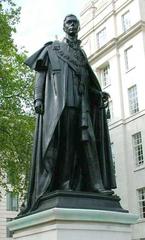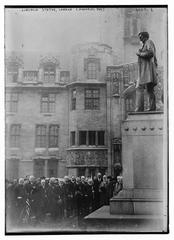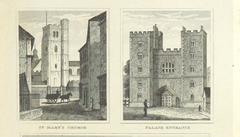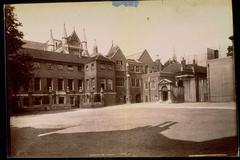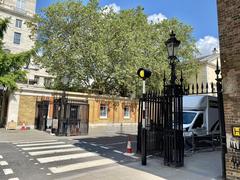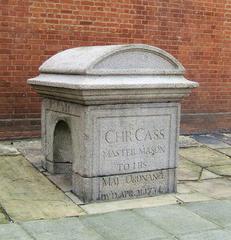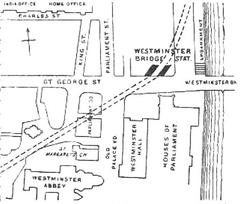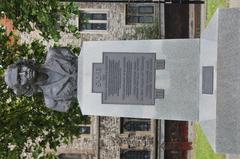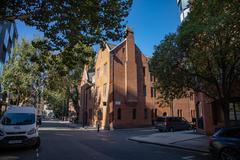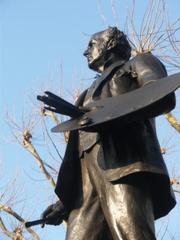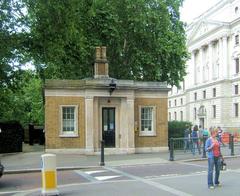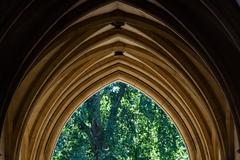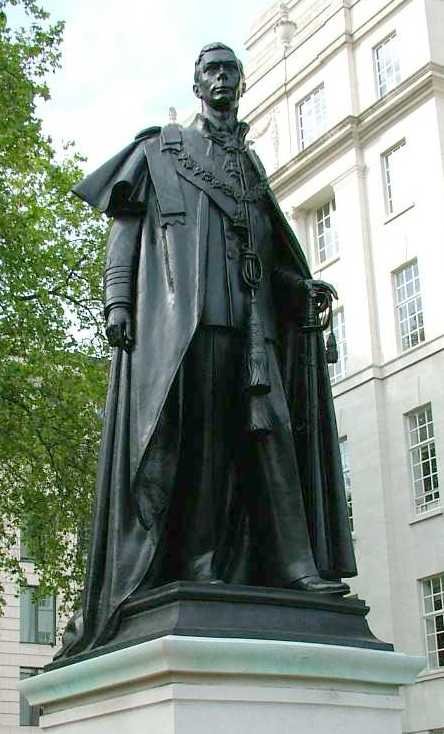
Statue of George VI, Kingston Upon Thames: Visiting Hours, Tickets, and History
Date: 14/06/2025
Introduction
The Statue of George VI in Kingston upon Thames stands as a distinguished testament to Britain’s royal heritage and the enduring legacy of King George VI. Located in the historic Royal Borough, this monument not only commemorates the king’s resilience and leadership during World War II but also highlights Kingston’s millennia-old royal connections, from Anglo-Saxon coronations to its modern status as a Royal Borough. Visitors are invited to engage with this landmark, set amidst civic treasures like the Guildhall and the Coronation Stone, and to discover how it anchors the town’s royal and cultural identity (BBC Travel, Kingston Heritage, Wikipedia, Candace Abroad).
This guide provides an in-depth look at the statue’s history, artistic features, and community role, along with practical visitor information: visiting hours, accessibility, transport options, nearby attractions, and tips for making the most of your visit.
Contents
- Introduction
- Historical Context
- Artistic Features & Symbolism
- Community & Educational Role
- Preservation and Engagement
- Visiting Information
- Hours and Admission
- Accessibility
- Getting There & Parking
- Tours and Events
- Nearby Attractions
- Frequently Asked Questions (FAQ)
- Conclusion & Travel Tips
- Sources
Historical Context
Royal Legacy and Local Significance
Kingston upon Thames is steeped in royal tradition. The town’s associations with British monarchy stretch back over a thousand years, notably serving as the coronation site of at least seven Anglo-Saxon kings, including Athelstan in 925 CE (BBC Travel). Its royal borough status, granted by King George V in 1927 and reaffirmed by Queen Elizabeth II in 1965, is celebrated through monuments like the Statue of George VI.
King George VI (1895–1952) ascended the throne unexpectedly in 1936 following his brother’s abdication. Leading Britain through World War II, he is revered for his steadfastness, dignity, and embodiment of national unity during a time of crisis. The statue in Kingston not only pays tribute to his leadership but also reinforces the borough’s unique place within the royal narrative (BBC Travel).
Architectural Setting
The statue is prominently positioned near Kingston’s Guildhall and Market Square, civic spaces integral to the town’s history. Nearby, the Coronation Stone serves as a tangible link to the town’s ancient royal ceremonies. The statue’s placement in this context enhances its historical resonance and accessibility for all visitors (Kingston Heritage).
Artistic Features & Symbolism
Design and Style
Crafted in bronze, the Statue of George VI presents the king in naval uniform—a choice that emphasizes his wartime service and leadership. The sculpture’s dignified realism and upright posture evoke themes of duty and resilience, while fine details in facial features and attire underscore the artist’s intent to capture both likeness and spirit (Wikipedia).
The stone plinth bears inscriptions marking George VI’s reign (1936–1952) and celebrates his role in steering the nation through adversity. This artistic decision to forgo royal regalia in favor of naval dress reflects the king’s close identification with the armed forces and his personal commitment to service (Kingston Heritage).
Integration with Kingston’s Urban Landscape
The statue is integrated harmoniously with Kingston’s civic architecture and heritage sites. Its location near the Guildhall and Market Place allows for easy viewing and photography and establishes a visual and symbolic continuity with other royal monuments, such as the Coronation Stone (A Lady in London: Kingston Guide).
Community & Educational Role
Civic and Ceremonial Functions
The statue is a focal point for civic ceremonies, including Remembrance Day, royal anniversaries, and local heritage events. During national commemorations, it is often adorned with floral tributes and serves as a gathering place for speeches and community celebrations (BBC Travel).
Educational Initiatives
Kingston’s schools and heritage organizations incorporate the statue into guided tours, history workshops, and educational programming. The nearby Kingston History Centre and Museum provide archival resources and interpretive materials that deepen visitors’ understanding of the statue’s context and significance (Kingston Heritage).
Cultural Impact
The Statue of George VI is featured in local art trails and exhibitions, enriching the borough’s cultural landscape and fostering community pride. It also plays a part in special events, such as the 1100th anniversary of King Athelstan’s coronation and the “Wild Kingston” public art exhibition (Kingston First: Wild Kingston).
Preservation and Community Engagement
Kingston’s local authorities, in partnership with heritage groups, ensure the ongoing maintenance and conservation of the statue. Community involvement is encouraged through volunteer opportunities, heritage workshops, and public events, all of which enhance the statue’s stature as a living symbol of Kingston’s royal legacy (Kingston Heritage).
Visiting Information
Visiting Hours & Admission
- Open 24/7: The statue is outdoors in a public space and can be visited at any time, free of charge.
- Best Times to Visit: Daylight hours are recommended for optimal viewing and photography.
Accessibility
- Step-free, wheelchair-friendly pathways around the statue and Market Square.
- Accessible public toilets are available nearby at Kingston Museum and Bentalls Shopping Centre.
- The area is suitable for visitors with mobility or sensory impairments, with additional support available at local museums (AccessAble).
Getting There & Parking
- By Train: Frequent South Western Railway services from London Waterloo to Kingston station (25–30 mins). The station is a short walk from the statue (Candace Abroad).
- By Bus: Numerous routes connect Kingston with surrounding districts.
- By Car: Several public car parks are within walking distance; parking may be limited at peak times.
- Cycling/Walking: Well-marked pedestrian and cycling routes throughout the town (Kingston Heritage).
Guided Tours & Events
- Kingston Tour Guides offer regular walking tours highlighting the borough’s royal heritage and public art, including the statue. Tours usually depart from the Ancient Market Place on Sundays at 11:00 a.m. (Kingston Tour Guides).
- Special cultural events, such as the Kingston 2025 Cultural Celebration, often feature the statue as a key landmark (Kingston 2025 Cultural Celebration).
Nearby Attractions
- Coronation Stone: Historic site of Anglo-Saxon coronations.
- Ancient Market Place: Vibrant square with markets, cafes, and public art.
- All Saints Church: Medieval church with royal connections.
- Kingston Museum & History Centre: Free entry, exhibitions on local and royal history.
- Riverside Promenade: Scenic Thames-side walks.
- Public Art: Notable works like “Out of Order” by David Mach (Candace Abroad).
Frequently Asked Questions (FAQ)
Q: What are the visiting hours for the Statue of George VI?
A: The statue is accessible 24 hours a day, year-round.
Q: Is there a fee or ticket required?
A: No, visiting the statue is free and open to all.
Q: Are guided tours available?
A: Yes, walking tours including the statue are offered by Kingston Tour Guides and can be booked in advance.
Q: Is the statue accessible for wheelchair users?
A: Yes, the surrounding area is step-free and suitable for wheelchairs and mobility aids.
Q: Can I take photographs?
A: Yes, photography for personal use is encouraged; commercial photography requires permission from the local council.
Q: What other historical sites are nearby?
A: Notable nearby attractions include the Coronation Stone, All Saints Church, Kingston Museum, and the riverside promenade.
Conclusion & Travel Tips
The Statue of George VI in Kingston upon Thames is more than a monument—it is a vibrant symbol of the borough’s royal history, community pride, and artistic heritage. Open to the public year-round and fully accessible, it is a must-see for anyone interested in British history, public art, or the enduring legacy of the monarchy.
Travel Tips:
- Visit during daylight for the best experience and photos.
- Combine your visit with a guided tour or nearby attractions for a fuller understanding of Kingston’s history.
- Check local event calendars for special commemorations or cultural celebrations.
- Download the Audiala app for guided audio tours and up-to-date event information.
Plan your visit today to experience the powerful legacy of King George VI and Kingston upon Thames firsthand.
Sources
- BBC Travel
- Kingston Heritage
- Wikipedia: List of public art in the Royal Borough of Kingston upon Thames
- Candace Abroad
- What’s On in Kingston upon Thames
- Kingston 2025 Cultural Celebration
- Kingston Council
- Kingston Tourism
- Kingston Tour Guides
- AccessAble
- A Lady in London: Kingston Guide
- Kingston First: Wild Kingston
